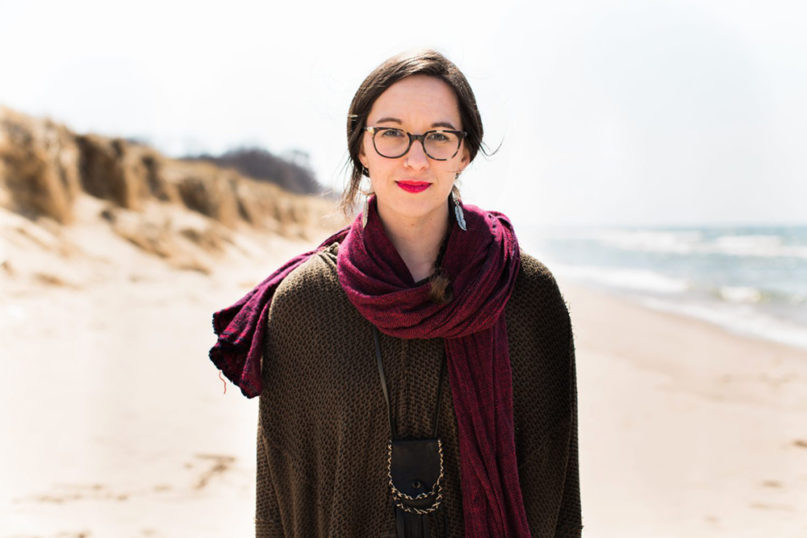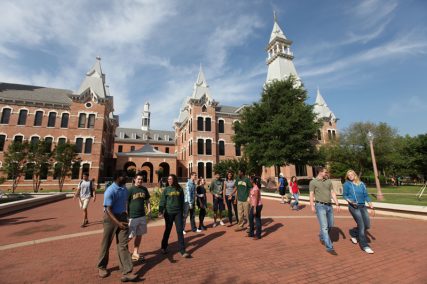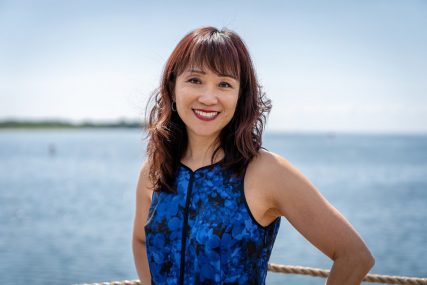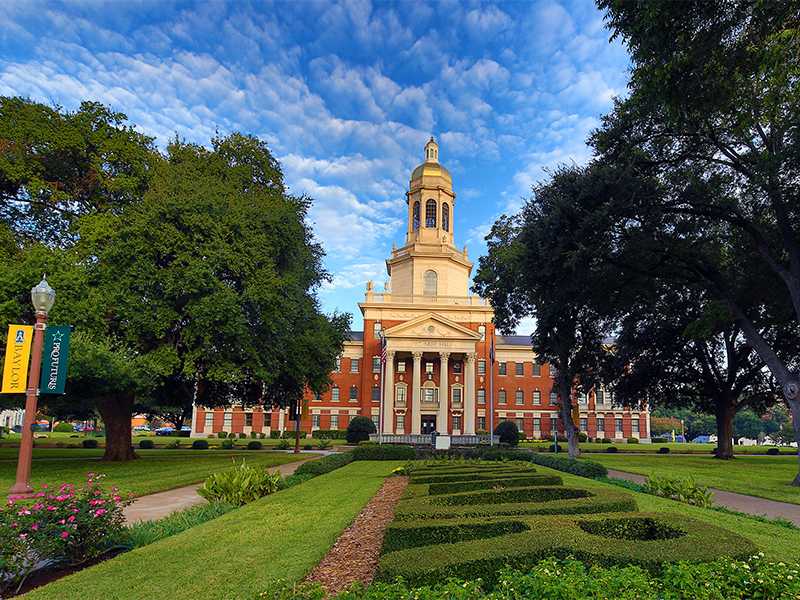(RNS) — A week after Potawatomi Christian author and speaker Kaitlin Curtice spoke in chapel at Baylor University, people are still talking about it.
Although perhaps not for reasons the school or speaker would hope.
Curtice’s remarks during the school’s three chapel services about her journey of “decolonizing” her faith drew pushback from a student group at the private Christian university in Texas, and her message was reportedly interrupted by a shouting student.
RELATED: Kaitlin Curtice talks about ‘everyday glory’ and her Native American heritage
The incident has drawn public apologies from at least one faculty member and an alum and brought back memories of a chapel service last year in which Kathy Khang, another progressive Christian author and speaker who is Korean-American, was heckled.
“I challenged some of them on a deep enough level that it rattled the walls of patriarchal white supremacy that they hide behind, and, well, I’ve done my job,” tweeted Curtice, who has declined interviews about the incident.
In the video of one Feb. 12 service posted on Baylor’s website, Curtice was introduced by Ryan Richardson, associate chaplain and director of worship and chapel at the school.
Richardson referenced an Air Force chaplain who had spoken in chapel the week before and said some people had disagreed with the chaplain’s comments. Similarly, some people might feel triggered by Curtice’s comments, he said, and he invited those people to come to the chapel table in the lobby and discuss what made them uncomfortable.
“This is a place that we’re going to bring diverse ideas and understandings of what it means to be a Christian in the world,” he said.
The chapel table always is available to students, Baylor told Religion News Service.
In her message, Curtice described her upbringing in a Southern Baptist home, the daughter of a mother of European descent and a father who was Potawatomi.

Kaitlin Curtice, Native American author, speaker and worship leader. Photo by Amy Paulson, courtesy of Kaitlin Curtice
After her family moved from Oklahoma and New Mexico to Missouri and her father left, she said, she lost her connection to her Potawatomi identity. Her journey as a Christian and as a member of the Citizen Potawatomi Nation has been one of “disconnect and reconnect” she said.
Part of that, she said, has been recognizing how colonization and the forced removal of Indigenous people from their homelands have left many disconnected from their identity, culture and spirituality. The Potawatomi were forced from Indiana to Kansas in 1838 on the Trail of Death.
“For me, as a mixed European and Potawatomi woman whose inner and outer voice has been silenced, especially by the church, I am reclaiming who I am, wrestling with all parts of my identity, my white privilege, my Native feminism, my spirituality,” Curtice said during the service.
“I’m questioning the systems that I participate in. I’m challenging myself to understand all the aspects of myself and the world around me.”
She encouraged students to “envision a decolonized spirituality” with her, calling out “white supremacy,” “toxic patriarchy,” “settler colonialism” and “capitalist greed.”
When the speaker said women are told they aren’t valued as much as men in society, a male student reportedly shouted, “Nobody says that!”
Curtice later tweeted she actually was interrupted twice by the same student — both times while talking about women.
The outburst was not part of the service that Baylor recorded and posted on its website.
After Curtice’s chapel message, a student group called Baylor Young Conservatives of Texas posted a statement on Twitter disavowing the service, where the group said it was met by “the liberal agenda.” It called on the university to apologize “for breaking with their mission to provide an unapologetically Christian chapel experience and for allowing a speaker with pagan sympathies to mislead students once again.”
One member of the group, Jake Neidert, told a local news outlet what was “most offensive” was that Curtice had not prayed to God, but to “Mother Mystery.”

Burleson Quadrangle, the heart of Baylor University’s campus in Waco, Texas. Photo courtesy of Baylor University/Robert Rogers
On Tuesday, Baylor confirmed in an email to RNS that it had reviewed video of all three chapel services in which Curtice spoke. At no time did she refer to “Mother Mystery,” the school concluded.
“We would apologize for reporting that incorrectly, but the rest of our statement still stands,” Baylor YCT said in an email to RNS.
Curtice noted in a tweet she’s never used “Mother Mystery” in a talk — but she’s “definitely going to now.”
In the video, the speaker begins her prayers by addressing God as “Mystery,” as she does in several prayers in her first book, “Glory Happening: Finding the Divine in Everyday Places,” published by Christian publisher Paraclete Press in 2017. That’s not without precedent in Christian tradition, according to Christian publication Relevant Magazine, which pointed to the ancient Latin text “O Magnum Mysterium,” or “O Great Mystery.”
Curtice’s second book, “Native: Identity, Belonging, and Rediscovering God,” will be released May 5 by Brazos Press, a division of Baker Publishing Group that publishes books by Christian thinkers.
Baylor told RNS it had spoken with Curtice before she came to chapel and expected her to speak from “Glory Happening.”
The college seemed to imply in a statement sent to those who had questions about chapel that it was surprised by her message. That statement reads in part: “On occasion, a speaker may veer away from our understanding of the message they planned to convey. When this happens, we address the matter with our Chapel students and invite them to come talk to us after Chapel.”
Curtice responded on Twitter, “The Baylor chapel leaders knew exactly what I was speaking on before I came.”
“We can pretend that what happened at Baylor is about me praying to Mystery, or we can recognize that based on the onslaught of anti-native attacks and accusations of being a pagan I’ve received since speaking there, it’s about something else,” she tweeted.
RELATED: Author Kathy Khang on why Christians need to speak up — on politics and everything else
The episode follows a similar disruption during chapel almost exactly one year ago at Baylor when Khang said she ended a message on several of Jesus’ healing miracles in the Gospel of Mark with a list of things that were breaking her heart and making her “desperate for Jesus.” Among them was the arrest of an 11-year-old Florida boy who had refused to stand for the Pledge of Allegiance.

Author Kathy Khang. Photo courtesy of Kathy Khang
That’s when she said a man yelled back, “That’s a lie. He made terrorist threats!”
The boy had no tie to terrorism. Florida police said he was arrested on charges of disrupting the classroom after an altercation with a substitute teacher over his ongoing refusal to stand for the pledge, according to reports at the time.
“This has never happened when a white male was speaking. This has never happened when a white woman was speaking,” student Meg Peck wrote in the Baylor Lariat.
“The common denominator in the equation? Both speakers were minority women,” wrote Peck. “This is white supremacy occurring in the exact place it should be combated, and this record of how Baylor students treat women of color who come to speak is not only shameful, but it says, to all speakers of color, they are not welcome here.”
Khang said she felt unsafe when she was heckled during Baylor’s chapel.
“If you are inviting me to talk about and call out institutional racism, if you are asking and inviting me to talk about what justice looks like and how that is drawn out and addressed in Scripture, I will do that. And organizations need to know, institutions need to know that sometimes their audiences are not as prepared as you think they are,” she said.
“And so I think that the safety concern has always been an honest and real one, but not taken very seriously.”
It’s not just Baylor, said Khang, who authored the book “Raise Your Voice: Why We Stay Silent and How to Speak Up.”
Just last week, panelists at Brigham Young University reportedly were bombarded with anonymous, racist messages as they discussed their experiences as people of color and immigrants at the Utah school, which is owned by the Church of Jesus Christ of Latter-day Saints.
That reflects shifts in society and culture, she said. And it touches on all kinds of topics that are uncomfortable to discuss, like power dynamics and disagreement.
“I think what is happening is that well-intentioned folks on the spectrum of politics within Christianity are not actually having the conversation around free speech and accountability … and how do we do that honoring the Imago Dei in one another?” Khang said.
On Twitter, Curtice pointed to the land acknowledgement she gave at the beginning of her message, a practice gaining popularity in the United States that names and honors the people indigenous to the land where the acknowledgement is delivered.
“If they reject everything else, at least every student at Baylor who walked into chapel heard that they were on Kickapoo/Tonkawa land, and they can never un-know that,” she said.
“I’ve done my job. I hope they do theirs, too.”





